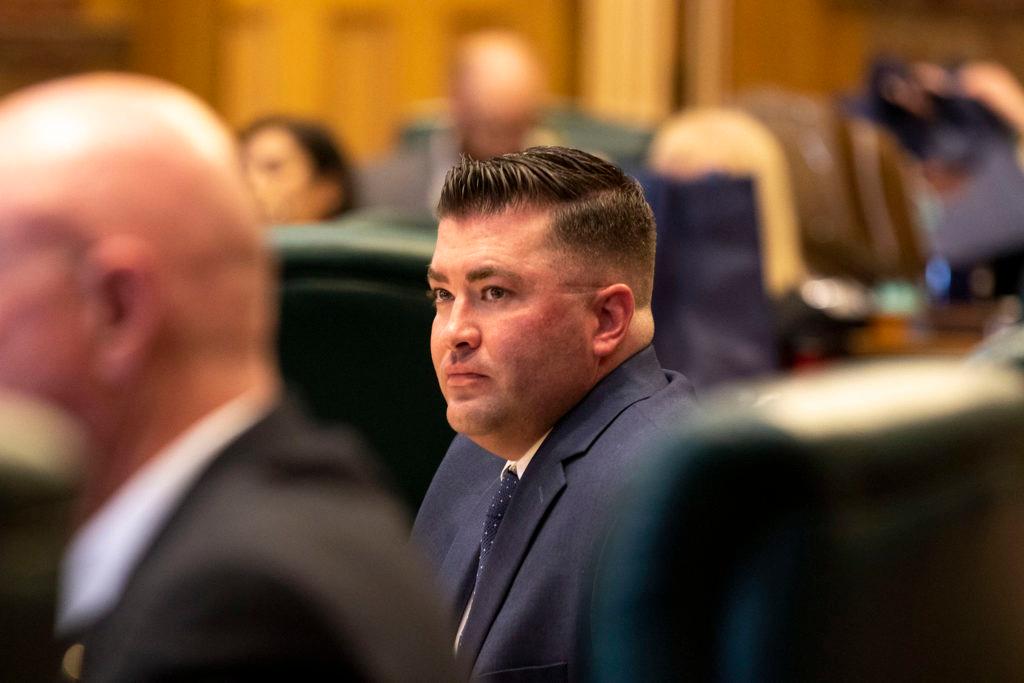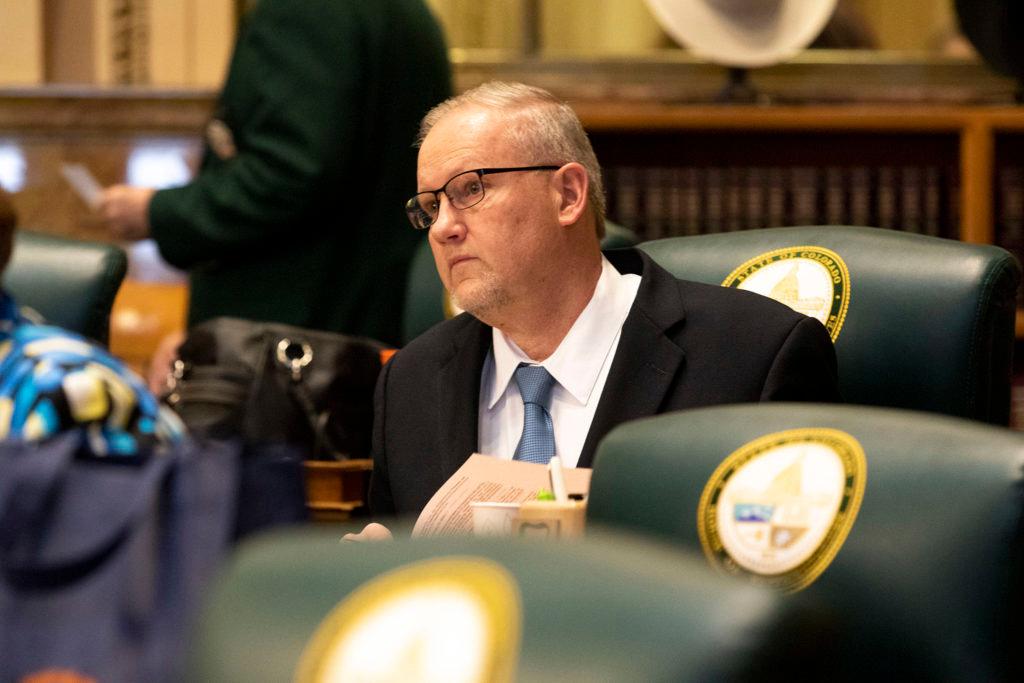
Americans’ views on same-sex marriage have shifted dramatically in the last 10 years. Today, more than 60 percent of the nation supports it, and the U.S. Supreme Court has made it the law of the land.
That explains the surprise at the state capitol, and even in some Republican circles, when four Colorado Republican lawmakers introduced a bill to ban same-sex marriage on Feb. 3. The measure also would have prohibited same-sex couples from adopting.
“It’s a needless provocation and a waste of people’s time. The only thing it serves to do is polarize people over an issue that’s by-and-large been settled and that public opinion polls show people have accepted,” said Rob Witwer, a former Republican representative who’s now unaffiliated, in an interview.
Former state Sen. Greg Brophy also tweeted that the bill “should have never been introduced” because it “reflects poorly on my side.”
Meanwhile, Democrats rallied against the marriage ban and several other proposals affecting transgender and gay people, which they described as the largest and most alarming set of anti-LGBTQ proposals in years.

“I’ll be damned if this bill, these bills, try to take away the rights of my family, the rights of my friends, and the rights of my community, period,” said Rep. Leslie Herod, a Denver Democrat and gay woman, in a press conference on Thursday afternoon shortly before the bills were heard in committee.
“But make no mistake: These bills will die today,” she added.
She was right. The controversial proposals were all voted down in a marathon hearing in a House committee that stretched into the early hours of Friday morning.
Why try to ban gay marriage now?
Four of the House’s 24 Republicans signed on to the bill, and it didn’t get explicit support from party leaders. But its backers described it as a chance to send a message.
“We all know this bill isn’t gonna pass in this current left-wing environment. It’s to remind everyone, this is the ultimate way to conceive a child,” said bill sponsor Shane Sandridge, a Colorado Springs Republican.
The bill states that kids do better in “natural” families — an argument strongly disputed by a review of research by Cornell University researchers. Its prime sponsor was Weld County Rep. Stephen Humphrey, a professional marriage counselor. Republican Reps. Dave Williams and Mark Baisley also signed on.
GOP leaders in Colorado largely steered clear of the gay marriage ban proposal, neither endorsing nor rejecting it. The state party declined to comment. A representative for Senate Minority Leader Chris Holbert said he would defer comment to the bill sponsors.

And for his part, House Minority Leader Patrick Neville said he wasn’t familiar with the “Colorado Natural Marriage and Adoption Act” introduced last week by his caucus members. He hadn’t given much thought to the idea of banning gay marriage, he said in an interview on Wednesday.
“I know the voters passed that (ban on same-sex marriage) in 2006 in Colorado, but then the Supreme Court’s weighed in since,” he said.
“I really don’t know. I think if you take a look at some states like Alabama, they’ve actually taken a different approach of just getting government out of marriage, and maybe that’s the track I would take.”
The message for 2020
Instead, Neville was more closely involved with other polarizing cultural bills that Democrats rejected this week.
He signed on as a sponsor of defeated bills that would have limited abortion to 22 weeks; banned gender-related medical treatments for trans youth; and allowed business owners to refuse to provide services that violate their religious beliefs, including for same-sex weddings.
“For me, life is the most important issue that we have in politics. You can’t have liberty, you can’t have property rights, you can’t have constitutional lights unless you first have a right to life,” he said.
With the 2020 elections approaching, the House minority leader said social and moral issues are a key part of the Republican message, alongside lower taxes and smaller government.
“I think it’s all of the above. The economy affects people every day, but these things also affect people,” Neville said, highlighting an earlier bill that would have required medical care in the very unlikely case an infant is delivered alive during an abortion procedure. Democrats said that’s covered by existing law.
“The fact that those types of bills keep getting defeated here at the legislature — we need to show the public that, show what the Democrats are doing,” Neville said.
Sandridge said that with Democrats leaning further left, there is “no room” for social moderates among Republicans.
House Republicans have been much more focused than their Senate colleagues in pursuing abortion, gender and sexuality issues. Republican Sen. Bob Gardner suggested that could be a result of the power dynamics in the two chambers.

House Republicans are significantly outnumbered by Democrats, while the Senate is more evenly split, giving Senate Republicans better hope of passing bills if they can gain a little bipartisan support.
Meanwhile, facing stiff opposition, House Republicans may be more interested than their Senate colleagues in sending messages with doomed bills.
“When they know that they can’t get (a bill passed), they do need to let their constituents know that they’re fighting the battle for them,” Gardner said.
Gender and sexuality issues hold special sway among Republican primary voters, according to pollster David Flaherty.
“If you’re going to use this as an issue, you’re going to use this to motivate an older base of voters,” he said. But by the same token, Flaherty said, these topics can drive Democrats to the polls in large numbers.
Daniel Ramos, director of the LGBTQ-advocacy group One Colorado, said the bills threatened to return Colorado to its “hate state” status of the 1990s.
“This really aggressive anti-LGBTQ slate is a bit surprising,” he said, adding that he doesn’t see the proposals as “representative of the Republican Party.”
Here are some of the other bills voted down in the nearly-all night hearing; they all failed on party-line, 6-3, votes:
Parents’ rights
The hearing started with hours of testimony on the “Parent’s Bill of Rights”, including debate over whether it would prevent gay youth from getting support. It drew dozens of supporters and opponents alike.
Sponsored by 15 Republican House members including Neville, it would enshrine parents’ authority on multiple fronts. Advocates said they need more protection from government interventions in everything from health care to sex education.
“They just feel like the state and the government are taking too much control over their children,” said Rep. Rod Pelton. “God gave these children to the parents.”
The bill would have established “a liberty interest and fundamental right for parents in the care, custody, and control of a parent’s child,” including the right to withdraw them from school clubs and “review all medical records.”
Concerns about vaccine requirements and the power of Child Protective Services came up often. Democrats are considering a proposal that would make it somewhat more inconvenient to get a vaccine exemption for schools.
“None of you are in my house, paying my bills,” said bill supporter Jessica Kish, adding that she was especially concerned about vaccines. “Nobody should mandate poison to go into my children or any children… The government is overreaching way too much.”
Pelton and others said the bill wasn’t about gender or sexuality. But opponents warned that the new standard would make it more difficult for LGBT youth to find help outside of unsupportive households or to seek therapy, and they argued that parental rights are already protected under existing law.
“Queer youth need spaces to express themselves without the influence of their parents,” said Zoe West, a student at the Denver Center for International Studies.
Supporters said a similar bill, Fundamental Family Rights in Colorado, would protect parents and children from wrongful separation by overzealous authorities when an accidental injury occurs. The Colorado Sun recently reported on a family separated from their child for 164 days on mistaken allegations of abuse.
Trans youth
Neville and 13 other House members — a majority of the Republican caucus — also supported a ban on gender-affirming medical treatments for transgender youth, which the bill described as mutilation and sterilization.
The proposal would have made it a crime for a doctor to provide hormone blockers, hormone therapy or surgery for a minor who wants to delay puberty or transition genders.
The bill wasn’t meant to “cast judgment” on trans people, Sandridge said. “It just says you should put certain guidelines on children,” he said, warning of regrets and medical effects.
Advocates and lawmakers said that the ban would have put transgender youth at risk of suicide by forcing them to live a gender role that doesn’t fit. Transgender people told the committee that transition is easier before puberty. Experts said that physical procedures are practically nonexistent for pre-adolescent children; the most common treatment is a reversible delay of puberty, PolitiFact reported.
“There is no doubt in my mind that if Jude was not allowed to transition with the professional help of (a doctor), she would not be alive today,” said Jenna Clinchard, mother of a transgender girl. “I’m here today to say that the government does not get to decide your child’s medical treatments.”
A second bill from Sandridge would have banned trans girls from playing on girls’ sports teams, saying they had an unfair advantage. If a girl’s sex was disputed, she would have to prove it with a doctor’s note about their anatomy, testosterone and chromosomes.
The trans-related bills drew little support at the hearing. They were opposed by panels of faith leaders, transgender people and their family members.
Religious freedom vs. public accommodation
Neville and seven other members also signed on to a “Live and Let Live” bill that would allow businesses, religious organizations and private professionals to refuse service for reasons of sexual orientation or gender identity.
The bill text argues that “tolerance must be mutual.” It fits into an ongoing national debate over religious rights, including the Supreme Court fight over whether a Colorado baker could be required to provide a cake for a same-sex wedding — a matter that wasn’t conclusively settled. And it closely mirrors bills introduced elsewhere, including Mississippi.
“You can go to another bakery and get the same product you want anyway. We don’t need to infringe on Jack’s rights and compel him, basically conscript him into doing something his beliefs are against,” Neville said, referring to Jack Phillips, the baker at the center of the Supreme Court case.
Opponents said the bill would effectively allow discrimination by everyone from government officials to landlords.
“You have to trust us. You have to listen. And you have to take us seriously,” said Rep. Brianna Titone, the state’s first openly transgender lawmaker. “We can’t pass bills to force us to live in the closet.”
What’s next?
The end of the bills won’t end the debate. A campaign already is gathering signatures to put a 22-week abortion ban on voters’ ballots in the 2020 election.
Sandridge suggested that the same approach could work for other social issues and it could be an increasingly attractive route for a conservative party in a blue-leaning state, he said, when it comes to issues he believes a majority of Coloradans would agree with him on.
Editor's note: This story was updated to correct the attribution of a quote by Zoe West.









